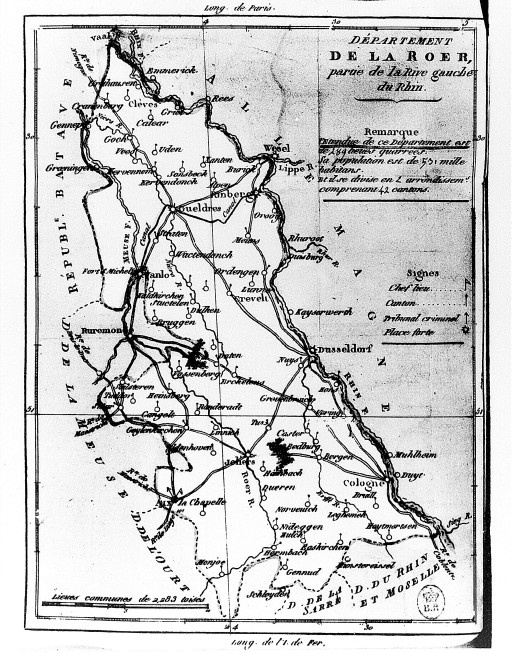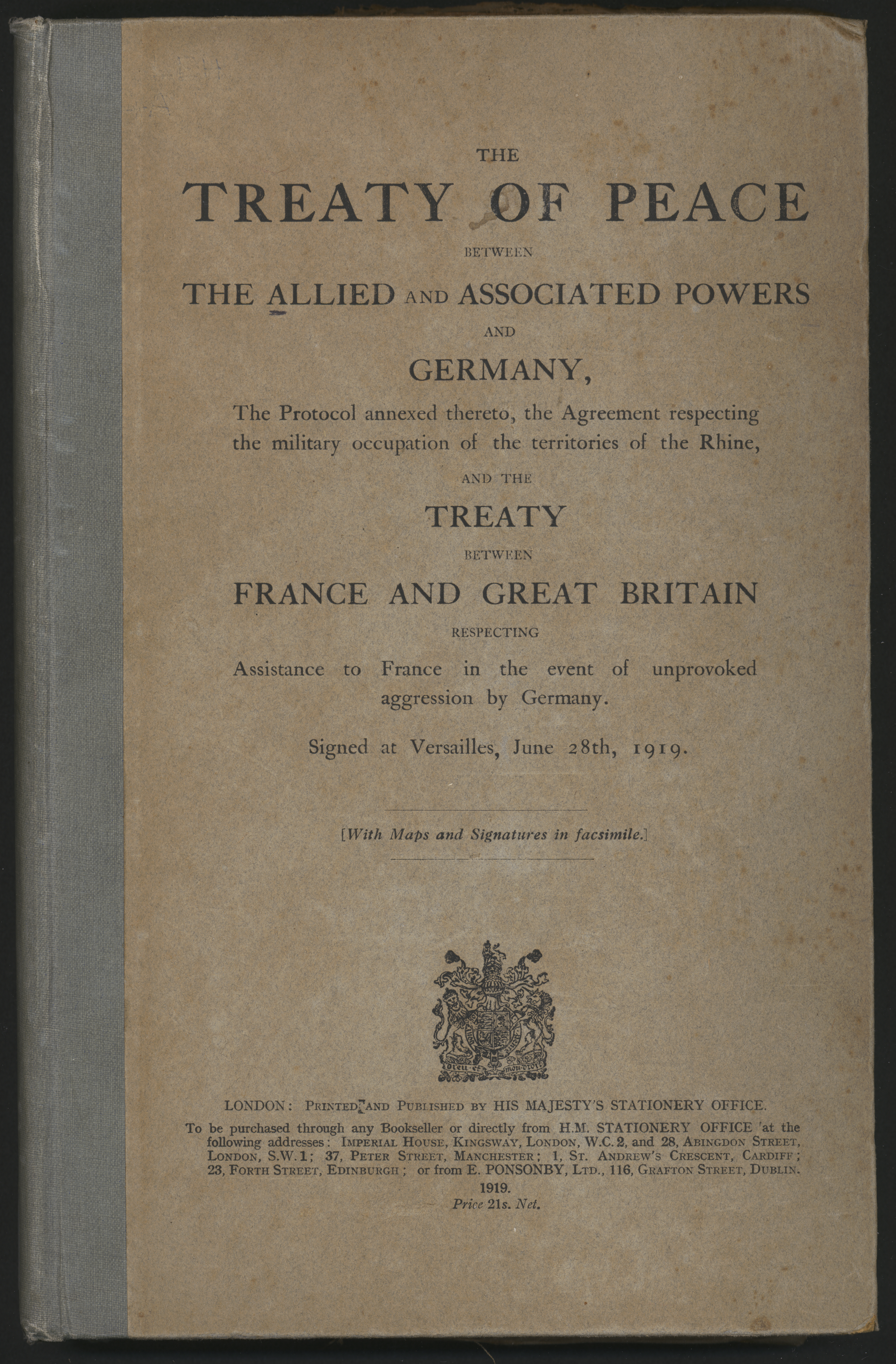|
Arrondissement De Cologne
The Arrondissement de Cologne was an administrative district of the Département de la Roer from 1798 to 1814 which was subdivided into cantons. History Occupation, annexation, and incorporation The occupation of areas left of the Rhine by French revolutionary troops occurred in late autumn of 1794. This annexation was preemptively recognised by the Peace of Campo Formio (1797) and later finalised in the Peace of Lunéville (1801). The structural area regulations from within this intermittent period were based largely on the plans and proposals for a reorganization of the conquered territories, which were developed by the Government Commissioner and Judge of the Court of Cassation, François Joseph Rudler. The areas to be incorporated into the Republic of France were then organised into Départements, much like the French provinces had been post-1789, abolishing the present forms of feudal regional administration causing a gradual assimilation of the Rhenish to the French l ... [...More Info...] [...Related Items...] OR: [Wikipedia] [Google] [Baidu] |
Roer (department)
Roer was a department of the French First Republic and later First French Empire in present-day Germany and the Netherlands. It was named after the river Roer (Rur), which flows through the department. It was formed in 1797, when the left bank of the Rhine was occupied by the French. The department was formed from the duchies of Jülich and Cleves, the part of the Archbishopric of Cologne left of the Rhine, the Free City of Aachen, the Prussian part of the duchy of Guelders and some smaller territories. In 1805 the city of Wesel was added to the department. The capital was Aix-la-Chapelle (''Aachen''). The department was subdivided in the following arrondissements and cantons (situation in 1812):Almanach Impérial an bissextil MDCCCXII p. 458-9, accessed in [...More Info...] [...Related Items...] OR: [Wikipedia] [Google] [Baidu] |
Peace Treaty
A peace treaty is an agreement between two or more hostile parties, usually countries or governments, which formally ends a state of war between the parties. It is different from an armistice, which is an agreement to stop hostilities; a surrender, in which an army agrees to give up arms; or a ceasefire or truce, in which the parties may agree to temporarily or permanently stop fighting. The art of negotiating a peace treaty in the modern era has been referred to by legal scholar Christine Bell as the , with a peace treaty potentially contributing to the legal framework governing the post conflict period, or . Elements of treaties The content of a treaty usually depends on the nature of the conflict being concluded. In the case of large conflicts between numerous parties, international treaty covering all issues or separate treaties signed between each party. There are many possible issues that may be included in a peace treaty such as the following: * Formal designation o ... [...More Info...] [...Related Items...] OR: [Wikipedia] [Google] [Baidu] |
Lunéville
Lunéville ( ; German, obsolete: ''Lünstadt'' ) is a commune in the northeastern French department of Meurthe-et-Moselle. It is a subprefecture of the department and lies on the river Meurthe at its confluence with the Vezouze. History Lunéville was a renowned resort in the 18th century, known as the capital of Lorraine. The grand Château de Lunéville, built in 1702 for Leopold, Duke of Lorraine to replace an older palace, was the residence of the duke of Lorraine until the duchy was annexed by France in 1766. The château was designed in the style of Versailles to satisfy Leopold's wife, Élisabeth Charlotte d'Orléans, the niece of Louis XIV, and became known as the "Versailles of Lorraine". It includes a chapel designed by Germain Boffrand. Leopold and his wife were the parents of Prince Charles Alexander of Lorraine and Francis I, Holy Roman Emperor (through him they were the grandparents of Marie Antoinette). The last duke of Lorraine was Stanislaus I, the form ... [...More Info...] [...Related Items...] OR: [Wikipedia] [Google] [Baidu] |
Napoleon I
Napoleon Bonaparte ; it, Napoleone Bonaparte, ; co, Napulione Buonaparte. (born Napoleone Buonaparte; 15 August 1769 – 5 May 1821), later known by his regnal name Napoleon I, was a French military commander and political leader who rose to prominence during the French Revolution and led successful campaigns during the Revolutionary Wars. He was the ''de facto'' leader of the French Republic as First Consul from 1799 to 1804, then Emperor of the French from 1804 until 1814 and again in 1815. Napoleon's political and cultural legacy endures to this day, as a highly celebrated and controversial leader. He initiated many liberal reforms that have persisted in society, and is considered one of the greatest military commanders in history. His wars and campaigns are studied by militaries all over the world. Between three and six million civilians and soldiers perished in what became known as the Napoleonic Wars. Napoleon was born on the island of Corsica, not long aft ... [...More Info...] [...Related Items...] OR: [Wikipedia] [Google] [Baidu] |
Centralized Government
A centralized government (also united government) is one in which both executive and legislative power is concentrated centrally at the higher level as opposed to it being more distributed at various lower level governments. In a national context, centralization occurs in the transfer of power to a typically unitary sovereign nation state. Executive and/or legislative power is then minimally delegated to unit subdivisions (state, county, municipal and other local authorities). Menes, an ancient Egyptian pharaoh of the early dynastic period, is credited by classical tradition with having united Upper and Lower Egypt, and as the founder of the first dynasty (Dynasty I), became the first ruler to institute a centralized government.. All constituted governments are, to some degree, necessarily centralized, in the sense that even a federation exerts an authority or prerogative beyond that of its constituent parts. To the extent that a base unit of society – usually conceived ... [...More Info...] [...Related Items...] OR: [Wikipedia] [Google] [Baidu] |
Hierarchy
A hierarchy (from Greek: , from , 'president of sacred rites') is an arrangement of items (objects, names, values, categories, etc.) that are represented as being "above", "below", or "at the same level as" one another. Hierarchy is an important concept in a wide variety of fields, such as architecture, philosophy, design, mathematics, computer science, organizational theory, systems theory, systematic biology, and the social sciences (especially political philosophy). A hierarchy can link entities either directly or indirectly, and either vertically or diagonally. The only direct links in a hierarchy, insofar as they are hierarchical, are to one's immediate superior or to one of one's subordinates, although a system that is largely hierarchical can also incorporate alternative hierarchies. Hierarchical links can extend "vertically" upwards or downwards via multiple links in the same direction, following a path. All parts of the hierarchy that are not linked vertically to on ... [...More Info...] [...Related Items...] OR: [Wikipedia] [Google] [Baidu] |
Prefect (France)
A prefect (french: préfet, plural ''préfets'') in France is the state's representative in a department or region. Subprefects (French: ''sous-préfets'') are responsible for the subdivisions of departments, known as arrondissements. The office of a prefect is known as a prefecture and that of a subprefect as a subprefecture. Regional prefects are ''ex officio'' the departmental prefects of the regional prefecture. Prefects are tasked with upholding the law in the department they serve in, including controlling the actions of local authorities to ensure adhesion to national guidelines. They are authorised to sue local collectivities in the name of the state. Prefects are appointed by a decree of the President of France when presiding the Government's Council of Ministers, following a proposal by the Prime Minister and the Minister of the Interior. They serve at the Government's discretion and can be replaced at any meeting of the Council of Ministers. From 1982 to 1988, und ... [...More Info...] [...Related Items...] OR: [Wikipedia] [Google] [Baidu] |
History Of Cologne
The German city of Cologne was founded in the 1st century as the Roman Colonia Claudia Ara Agrippinensium. It was taken by the Franks in the 5th century and became an important city of Medieval Germany, the seat of an Archbishop and a Prince-Elector. As the Free Imperial City of Cologne it was one of the centers of the Hanseatic League in the early modern period. Most of the city was destroyed in the bombing of Cologne in World War II, so it was of limited importance in post-war West Germany. It had returned to its pre-war population by 1959, by which time Düsseldorf was the political center of the state of North Rhine-Westphalia, and Bonn was the (provisional) capital of the Federal Republic. In the late 20th century, Cologne grew into a center of the sprawling Rhine-Ruhr metropolitan area, with some 12 million inhabitants, just over one million of whom live in Cologne proper (as of 2012), making the city the fourth largest in Germany (after Berlin, Hamburg and Munich). ... [...More Info...] [...Related Items...] OR: [Wikipedia] [Google] [Baidu] |






